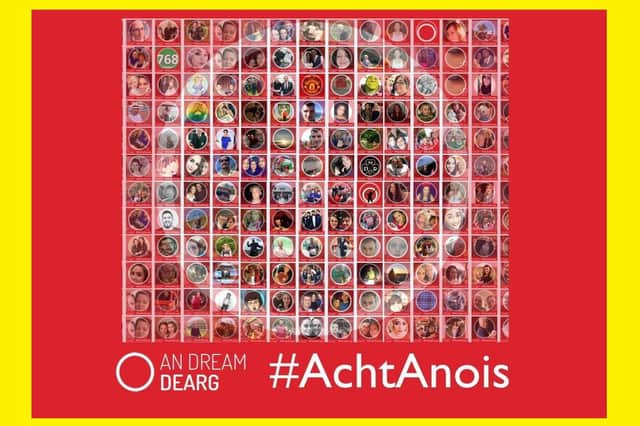Q&A: A few questions for Irish activist group An Dream Dearg


It spanned three pages, and consisted of a statement calling for an Irish language act.
It then listed the names of 1,000 people from the media, sports, and arts who supported it.
An Dream Dearg has been active for several years.
Advertisement
Hide AdAdvertisement
Hide AdBut it is not a formal body, in the sense that it is neither registered as a charity nor as a not-for-profit company.
The News Letter put a handful of questions to An Dream Dearg.
For example: Who leads the group – is there a board of directors, or an overall boss? And how is it funded?
The unnamed respondent said: “An Dream Dearg is an open campaign network - it is supported by individuals and Irish language organisations but is not an organisation itself nor does it have a board of directors.
Advertisement
Hide AdAdvertisement
Hide Ad“It is a model which is common across other rights issues, bringing people together to organise in support of language rights. Not an organisation in itself but a representative campaigning network.”
‘SECOND CLASS CITIZENS’:
It was also asked about three specific claims made in its Irish News advert, namely:
That there are “egregious and systematic attacks on our rights”;
There has been “frequent public and hostile ridiculing of the Irish language from elected representatives”;
Advertisement
Hide AdAdvertisement
Hide Adand that Irish speakers have been treated as “second class citizens”.
The News Letter asked An Dream Dearg to please elaborate.
It said: “There is a long established history of discriminatory and regressive policies designed to damage and destroy the Irish language as a spoken community language, from the 14th Century Statues of Kilkenny, to the 1737 Act of Justice banning Irish in Courts (this is still enforced), and more recently, to the banning of Irish on public signage and pioneers opening Irish language schools in the 1970s being threatened with imprisonment.
“This letter makes clear the ‘resolute action’ promised in the GFA was never realised.”
This is a reference to the following clause in the 1998 Agreement:
Advertisement
Hide AdAdvertisement
Hide Ad“[The] British Government will in particular in relation to the Irish language, where appropriate and where people so desire it, take resolute action to promote the language.”
‘IRISH ACT ONE SMALL WAY OF FULFILLING OBJECTIVES’:
An Dream Dearg went on to say: “[M]any local councils have regressive or zero Irish language policies in place, falling well below and in breach of international standards.
“International oversight bodies (see COMEX, the monitoring body from the Council of Europe for the European Charter for Regional Minority Languages) are consistently critical of the absence of rights, legislations and basic services for Irish speakers, decades after the British Government ratified international treaties committing them to same.
“The absence of rights, policies and support for developing the language leaves us decades behind language revival efforts in Wales, for example.
Advertisement
Hide AdAdvertisement
Hide Ad“That is down to political blocks and delays, both here and at Westminster.
“Since 2020, for example, the Irish language strategy promised in NDNA (& St Andrews legislation - see Sec 28d of NI Act) was blocked 26 times by the Executive Office, in breach of the law.
“This is compounded by petty political decisions undermining the limited support the Irish language receives, like the 2016 Líofa cuts, the renaming of boats and the removal of Irish from departmental websites, to cite several recent examples.”
When it came to specific examples of “persistent ridiculing” of Irish by politicians, which the News Letter had requested examples of, it provided a single one: the case of Gregory Campbell speaking mock-Irish in the Assembly eight years ago.
Advertisement
Hide AdAdvertisement
Hide AdThe group concluded that, when it comes to realising its own overarching vision, an Irish language act is just one small part of the picture.
It said: “Legislation would go a small way to addressing some of these issues, whilst an Irish language strategy would give us a developmental road map to ensure strategic civic and educational interventions with the aim of promoting and enhancing the development of the language in the years ahead.”
More from this reporter: